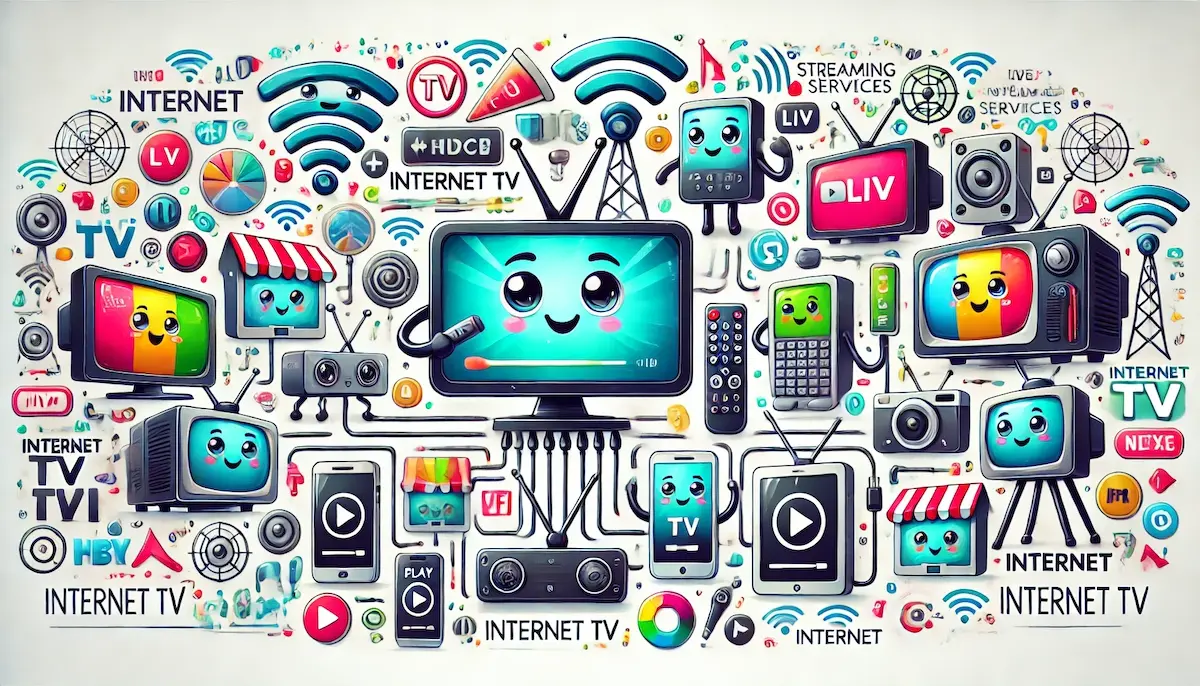Internet TV, also known as online television, is a modern way of consuming television content via the internet. Unlike traditional broadcast or cable TV, which relies on physical infrastructure, Internet TV streams content directly to your device over an internet connection. This form of television has gained immense popularity due to its flexibility, variety, and accessibility. Let’s explore what Internet TV is, how it works, and its benefits.
What is Internet TV?
Internet TV refers to the delivery of television content, such as TV shows, movies, and live broadcasts, over the internet. This can be done through various platforms and devices, including computers, smartphones, tablets, smart TVs, and dedicated streaming devices like Roku, Amazon Fire Stick, and Apple TV. The content can be accessed on-demand or through live streaming services, offering a more personalized and flexible viewing experience compared to traditional TV.
How Does Internet TV Work?
Internet TV works through the following steps:
- Content Creation and Licensing: Content creators produce TV shows, movies, and other video content, which is then licensed to streaming platforms.
- Digital Encoding and Storage: The content is digitally encoded and stored on servers, making it accessible over the internet.
- Streaming Technology: When a user selects a video to watch, the content is delivered to their device in real-time using streaming technology. Adaptive bitrate streaming ensures smooth playback by adjusting the quality based on the viewer’s internet speed.
- User Interface: Viewers access content through a user-friendly interface provided by the streaming platform, where they can browse, search, and select what to watch.
Types of Internet TV Services
Internet TV services can be broadly categorized into three types:
- Subscription-Based Services (SVOD): These services require a monthly or annual subscription fee for unlimited access to a library of content. Examples include Netflix, Amazon Prime Video, and Disney+.
- Ad-Supported Services (AVOD): These platforms offer free access to content but include advertisements. Examples include YouTube, Tubi, and Pluto TV.
- Live TV Streaming Services: These services provide live broadcasts of TV channels over the internet, similar to traditional cable or satellite TV but with added flexibility. Examples include Hulu + Live TV, Sling TV, and YouTube TV.
Popular Internet TV Platforms
Several platforms dominate the Internet TV landscape, each offering unique features and content:
- Netflix: Known for its extensive library of movies, TV shows, and original content, Netflix is one of the most popular subscription-based services.
- YouTube: The largest video-sharing platform, YouTube offers a vast range of user-generated and professional content, including live streams.
- Hulu: Provides a mix of on-demand TV shows, movies, and live TV streaming, with a focus on current episodes from major networks.
- Amazon Prime Video: Part of the Amazon Prime subscription, this service offers a wide selection of content, including exclusive originals and live sports.
- Disney+: Features content from Disney, Pixar, Marvel, Star Wars, and National Geographic, catering to family-friendly entertainment.
Benefits of Internet TV
Internet TV offers numerous advantages over traditional television:
- Flexibility: Watch what you want, when you want, on a variety of devices, without being tied to a broadcast schedule.
- Variety: Access a vast array of content, including exclusive originals, classic films, and international shows.
- Cost-Effectiveness: Many Internet TV services offer competitive pricing compared to traditional cable or satellite TV packages.
- No Contracts: Most services operate on a month-to-month basis, allowing users to cancel anytime without long-term commitments.
- Personalization: Advanced algorithms recommend content based on viewing habits, providing a tailored experience.
The Future of Internet TV
The future of Internet TV looks promising, with several trends set to shape its evolution:
- Technological Advancements: Improvements in streaming technology, such as 5G and artificial intelligence, will enhance the quality and personalization of Internet TV services.
- Content Innovation: Continued investment in original content and innovative formats, such as interactive and immersive experiences, will attract more viewers.
- Global Expansion: Internet TV platforms will continue to expand into new markets, offering localized content to diverse audiences.
- Integration with Other Services: Partnerships with other digital services, such as gaming and social media, will create more comprehensive entertainment ecosystems.
Blockfine thanks you for reading and hopes you found this article helpful.
